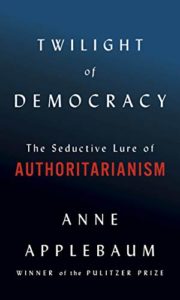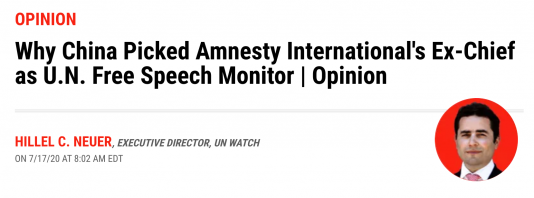Democracy and Decency by Chris Patten @ProSyn https://t.co/2znlCO1ner
— Democracy Digest (@demdigest) July 20, 2020
Whatever their Western apologists may claim, Russia and China are clearly trying to weaken liberal democracies by attacking the values that underpin them. Open societies – including the United States under a president who believes in alliances – must unite in defense of what they know is right, argues Chris Patten, Chancellor of the University of Oxford, the last British governor of Hong Kong and a former EU commissioner for external affairs.
What will happen to the values that form the core of our political and cultural identity if we do not stand up for them? he asks on Project Syndicate:
 Here, I cannot recommend strongly enough Anne Applebaum’s recent book Twilight of Democracy: The Failure of Politics and the Parting of Friends. Advancing her arguments with eloquence and personal testimony, Applebaum* passionately decries the corrosion of liberal, open-society values in the last three decades. Her book is a practical reminder of what all democrats should have learned from reading Karl Popper’s magisterial The Open Society and Its Enemies, itself written in liberal democracy’s darkest hours during WWII. RTWT
Here, I cannot recommend strongly enough Anne Applebaum’s recent book Twilight of Democracy: The Failure of Politics and the Parting of Friends. Advancing her arguments with eloquence and personal testimony, Applebaum* passionately decries the corrosion of liberal, open-society values in the last three decades. Her book is a practical reminder of what all democrats should have learned from reading Karl Popper’s magisterial The Open Society and Its Enemies, itself written in liberal democracy’s darkest hours during WWII. RTWT
*A National Endowment for Democracy (NED) board member.
Writing in Newsweek magazine, UN Watch executive director Hillel Neuer revealed (see op-ed below) that China was chair of the U.N. Human Rights Council vetting process that nominated Amnesty International’s former chief Irene Khan to be the next world monitor on free speech—a decision that was just ratified by the 47-nation plenary—and that she enjoys close ties with Beijing’s Communist regime:
Under Khan, Amnesty International seemed to lose its moral compass. In 2005, she called the U.S. prison for enemy combatants at Guantanamo Bay the “Gulag of our time.” For historian Anne Applebaum of the Washington Post, who was equally “appalled” by the Bush administration’s detention practices and interrogation policies, Khan’s comparison with the colossal Soviet system of thousands of forced-labor camps demonstrated her ignorance, misuse of language and moral confusion.
Under Khan, Amnesty refused to distinguish between a country having blots on its system, and those where the blots are the system. Khan left Amnesty in 2009, forced out under mysterious circumstances. Members of the organization were outraged to learn that she received a golden handshake worth some $700,000, a payment later criticized by an independent reviewer as “seriously excessive.” RTWT








